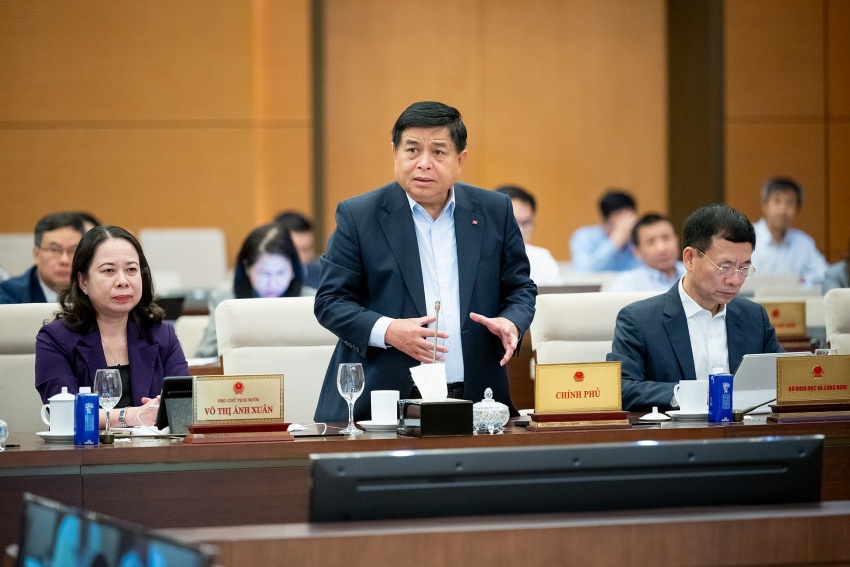Vietnam mulls scaling investment approval authority for nuclear projects
 |
| Deputy Prime Minister Nguyen Chi Dung gave his opinion on revising the Law on Atomic Energy. Photo: quochoi.vn |
During its 44th session on April 14, the NA Standing Committee reviewed proposed revisions to the Law on Atomic Energy. A central point of debate was the government’s proposal to delegate investment policy approval for nuclear power projects currently the NA’s jurisdiction under existing investment regulations to the prime minister.
NA Vice Chairman Vu Hong Thanh expressed support for stronger decentralisation. However, he cautioned that any shift in authority must be carefully considered and fully reported to the National Assembly for deliberation. He noted that nuclear projects entail not just substantial capital, but also require tailored policies to ensure timely implementation—citing the precedent set by the now-shelved Ninh Thuan nuclear project.
“Beyond decentralisation, there must be clarity on whether future nuclear projects will benefit from similar special mechanisms as Ninh Thuan, or new ones, to fast-track progress. Without acceleration, we risk compromising our energy security,” he said.
Thanh proposed more streamlined investment procedures for nuclear power projects to reduce administrative bottlenecks.
Chairman of the NA’s Committee for Legal and Judicial Affairs Hoang Thanh Tung echoed the sentiment but urged caution. “This is a major shift. While the drive for decentralisation is commendable, nuclear power projects are of national significance. They impact the environment, economy, and social structure–often requiring resettlement–and therefore traditionally fall within the NA's authority,” Tung said.
He argued that presenting comprehensive dossiers to the NA would not necessarily delay progress, while also enhancing legal legitimacy and public support through parliamentary debate.
Tung further recommended that any move towards delegation must ensure coherence across criteria–not only investment capital, but also environmental and social impact.
Chairman of the NA Economic and Budgetary Committee Phan Van Mai also supported the idea of strong decentralisation but emphasised the need for clear definitions of responsibilities, processes, and accountability to ensure efficiency without confusion.
Responding to lawmakers’ concerns, Deputy Prime Minister Nguyen Chi Dung clarified that decentralisation aligns with the government’s broader strategy to empower lower levels of authority for more agile governance. However, he acknowledged the exceptional sensitivity of nuclear energy.
“Nuclear safety must be the top priority as it directly concerns public health and safety,” he said. “Small and medium-scale nuclear projects–based on modular, standardised technologies–could be managed by the prime minister. But large-scale projects, such as those exceeding 2,000 MW like the former Ninh Thuan plant, should remain under the purview of the NA,” he said.
He committed to providing a more detailed explanation of the proposed changes, including the rationale for delegation and its implications, ensuring that safety and responsiveness remain balanced.
“The overarching policy direction belongs to the NA, but when it comes to individual projects, there should be more operational flexibility. Still, after today’s feedback, we will consult the prime minister on whether to define delegation authority based on project size–small and medium projects under the prime minister, large ones under the NA,” Dung added.
What the stars mean:
★ Poor ★ ★ Promising ★★★ Good ★★★★ Very good ★★★★★ Exceptional
Related Contents
Latest News
More News
- Kurz Vietnam expands Gia Lai factory (February 27, 2026 | 16:37)
- SK Innovation-led consortium wins $2.3 billion LNG project in Nghe An (February 25, 2026 | 07:56)
- THACO opens $70 million manufacturing complex in Danang (February 25, 2026 | 07:54)
- Phu Quoc International Airport expansion approved to meet rising demand (February 24, 2026 | 10:00)
- Bac Giang International Logistics Centre faces land clearance barrier (February 24, 2026 | 08:00)
- Bright prospects abound in European investment (February 19, 2026 | 20:27)
- Internal strengths attest to commitment to progress (February 19, 2026 | 20:13)
- Vietnam, New Zealand seek level-up in ties (February 19, 2026 | 18:06)
- Untapped potential in relations with Indonesia (February 19, 2026 | 17:56)
- German strengths match Vietnamese aspirations (February 19, 2026 | 17:40)

 Tag:
Tag:




















 Mobile Version
Mobile Version